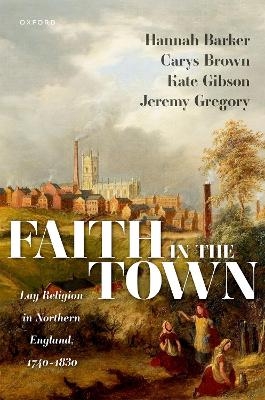
Faith in the Town
Oxford University Press (Verlag)
978-0-19-893576-6 (ISBN)
- Noch nicht erschienen (ca. März 2025)
- Versandkostenfrei
- Auch auf Rechnung
- Artikel merken
This is an open access title available under the terms of a CC BY-NC-ND 4.0 International licence. It is free to read on the Oxford Academic platform and offered as a free PDF download from OUP and selected open access locations.
Across eighteenth- and early nineteenth-century northern England, religious faith continued to affect the lives of men, women, and children in profound ways. Rather than abandoning their faith in the face of increasing urbanisation and industrialisation - as is often assumed was the case - town dwellers across the social and denominational spectrum commonly understood their relationships with their families, households, and the world within a framework of religious duty and virtue. For urban middling and labouring individuals, religious practice and the influence of faith was not limited to time spent in church or chapel but extended into all areas of activity and experience: the workplace, the streets and other public spaces, and the home.
The importance of faith in the lived experience of town dwellers was not something that existed in spite of change; faith was promoted by the new conditions of urban life. Faith in the Town explores key decades of this transformational period, encompassing almost a century of urban development between 1740 and 1830. By placing lay religious belief centre-stage, this book demonstrates that many of the developments associated with 'modernity', specifically industrialisation, urbanisation, population growth, and Enlightenment thinking, were not inimical to faith. Instead, religious belief and lay piety was a crucial element in the formation of urban economy, society, and culture during the 'long' eighteenth century, meaning that northern towns were not only places where faith could both be nourished and flourish, but that these urban centres were themselves shaped by faith.
Hannah Barker is Professor of British History at the University of Manchester. She is a historian of eighteenth- and early nineteenth-century northern England. Her recent research has explored issues of gender, work, and faith in towns and her publications in this field include The Business of Women (OUP, 2006), 'Soul, purse and family: middling and lower-class masculinity in eighteenth-century Manchester', Social History (2008), Family and Business During the Industrial Revolution (OUP, 2017) which won the Social History Society book of the year, and 'A devout and commercial people' in Revisiting the Polite and Commercial People (OUP, 2019). Carys Brown is Head of Academic, Personal, and Professional Development at Trinity College, Cambridge, where she was previously a Research Fellow. Prior to this, she was a Research Associate on the 'Faith in the Town' project. Her primary research interests are in the social, cultural, and religious history of late-seventeenth and eighteenth-century Britain, with a particular focus on religious coexistence and on the history of children. Her monograph, Friends, Neighbours, Sinners: Religious Difference and English Society, 1689-1750 was published in 2022. Kate Gibson is a Leverhulme Research Fellow at the John Rylands Research Institute, University of Manchester. She was previously a Research Associate on the 'Faith in the Town' project. She is a social historian of eighteenth-century Britain, with a particular interest in the reproduction of inequality through family relationships. Her monograph, Illegitimacy, Family and Stigma in England, 1660-1834 was published by OUP in 2022. She is currently working on the history of fostering and adoption in Britain from 1700 to 1839. Jeremy Gregory is Pro-Vice-Chancellor for the Faculty of Arts and Professor of the History of Christianity at the University of Nottingham. His research and publications have shaped and contributed to the debates concerning the role of the Church of England in particular, and religion in general, in English social, cultural, political, and intellectual history from the mid-seventeenth to the mid-nineteenth centuries. His edited book, Manchester Cathedral: A History of the Collegiate Church and Cathedral, 1421 to the Present, was published in 2021. He edited The Oxford History of Anglicanism, Volume II Establishment and Empire, 1662-1829 (OUP, 2017; paperback 2019).
| Erscheint lt. Verlag | 31.3.2025 |
|---|---|
| Zusatzinfo | 72 |
| Verlagsort | Oxford |
| Sprache | englisch |
| Maße | 156 x 234 mm |
| Themenwelt | Geschichte ► Allgemeine Geschichte ► Neuzeit (bis 1918) |
| Geschichte ► Teilgebiete der Geschichte ► Kulturgeschichte | |
| Geschichte ► Teilgebiete der Geschichte ► Religionsgeschichte | |
| ISBN-10 | 0-19-893576-5 / 0198935765 |
| ISBN-13 | 978-0-19-893576-6 / 9780198935766 |
| Zustand | Neuware |
| Informationen gemäß Produktsicherheitsverordnung (GPSR) | |
| Haben Sie eine Frage zum Produkt? |
aus dem Bereich


